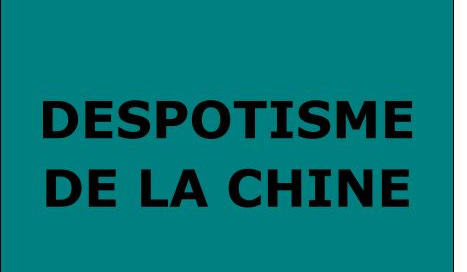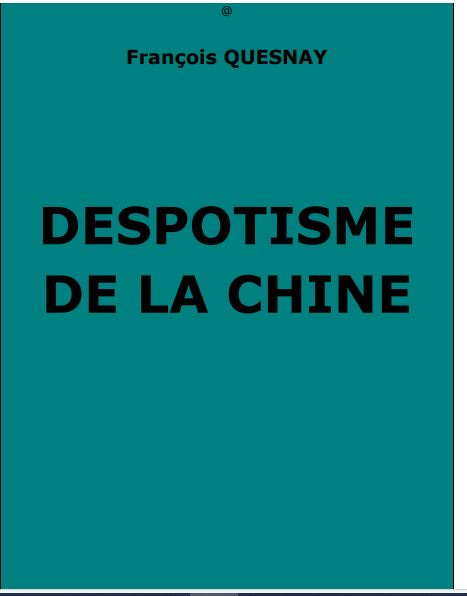Physiocrats are not much read today. This is unfortunate because many of their views have present-day relevance. Their writings were often intentionally murky and paradoxical, expressed in a form that is seldom used today, in maxims and short and at times enigmatic, sentences and in the famous Tableau economique whose overall idea is clear but details baffling. To economists today, they bring, on the one hand, common neoclassical views on freedom of trade, free circulation of labor, capital and goods (across regional lines within a single nation-state and between the countries), freedom of contract between workers and capitalists, single tax, and progressive taxation of wealth. On the other hand, they are (I think) often misunderstood to have thought that agriculture is inherently more productive than manufacturing. A much more reasonable explanation of their position is to point out that only in agriculture did an income source, the land rent, exist that could have been taxed without “creating injury” to production. It is only in that sense ---tax-yielding—that agriculture was seen as more “productive” than manufacturing. (Incidentally, similar misapprehensions exist today when manufacturing jobs are considered inherently “better”” than jobs in services.)
The part of the physiocratic doctrine which is even less studied than economics is their politics. They were defenders of absolute monarchy of a special kind. The imperial China to which Quesnay (in response to Montesquieu’s critique of China in “The Spirits of the Laws”) dedicated an entire monograph of more than 100 pages, was their ideal kingdom.
Physiocrats’ rationale is similar to that of the Chinese legalist tradition. For physiocrats it went as follows. Once the natural laws (“la loi naturelle” or even “physiocracy”, the term apparently invented by Quesnay who liked to play with Greek neologisms) that consist in personal freedom, private property and security of person, are discovered, there is not much more that a society needs to do but enforce them. It needs only two things: (1) a body of educated people who are selected according to merit and who understand the body of laws and might improve and refine it, and (2) an absolute sovereign whose role is to make sure that the laws are enforced. Most of the time, and ideally all the time, the sovereign does nothing since the laws, if followed, establish that perfect equilibrium between the private and the public interest. The sovereign is at the same time the most and the least powerful person in the state. He is the most powerful because he alone can put an end to the rot if it happens that the laws are transgressed; but since the likelihood of transgression is small –given that the laws are the most rational possible—sovereign most of the time has nothing to do.
Quesnay found the then Chinese system, as known as that time in Europe, to be the closest approximation to that ideal. Unlike the French aristocracy of blood that was the body of people who interposed themselves between the sovereign and the people, the Chinese mandarinate was selected on merit. It designed the most perfect laws because it consisted of the most talented people. It goes without saying that physiocrats saw themselves in that role: as a replacement for a decadent, ignorant and indolent aristocracy. The “absolute” rule can still remain, but now it would be based on right principles and use of the right people.
As Quesnay says at the introduction on his treatise on China entitled “Despotism of China” (1767), the term “despotism” has two meanings. The first is unchecked or absolute power within the law and used to make sure the laws are respected, the second is unchecked and arbitrary personal rule. Under the first title, despotism is fully legal (since based on the enforcement of legality) and legitimate, under the second, illegitimate:
Despot means MASTER or LORD: this title can therefore be applied to sovereigns who exercise absolute power regulated by laws, and to sovereigns who have usurped arbitrary power which they exercise for good or evil over nations whose government is not regulated by fundamental laws. There are therefore legitimate despots and arbitrary and illegitimate despots.
Democracy, defined as the selection of rulers by the ruled, has no place in the physiocratic system. It is entirely redundant. It is not clear what its role would be (had they ever envisaged it): perhaps only to mess up the perfect principles of the natural law.
The relevance of physiocrats’ thought is obvious when we consider today’s Chinese system. Formally speaking, it is similar to the system Quesnay described. An absolute sovereign is selected from within the ruling group, and the legitimacy of his rule is reflected in the excellence of the laws and the quality of the body of people who implement these laws. The quality of a social system is therefore judged by its performance. The key part of that performance -and physiocrats were in this the precursors of what we consider today a “normal view”—is how fast economic abundance is increasing for the majority of the population. If people are getting steadily richer, there is little or nothing to change in the laws. And therefore nothing for the mandarinate or sovereign to do.
The system is, like any person, judged based on its performance, not on the technical ways its rulers have been selected, how strong is the state, or any other “extraneous” objective. It is the rule “for the people”.




I’m suspicious of the general idea that all we need is to implement some particular institution, and there is no role for ex-post judgement to evaluate outcomes. It’s a very deep idea in Western ideologies. The neo-liberals say all we need are competitive markets, and the only policy prescription is to correct market failures so they become more like the ideal competitive market. Or the idea that all we need are elections, and there is no need for consultations and engagement with people in between elections. And now, all we need is to implement and enforce laws!
Why is there such a strong desire for “one ring to rule them all” solution in Western philosophy?
I don’t know about imperial China, but the current CCP led government long abandoned any idea that there is a perfect institution (eg equal distribution of property, public ownership, etc). Rather, the overall philosophy is the one that Deng espouses: to cross the river by feeling for stones; or it doesn’t matter whether the cat is black or white as long as it catches rats! That is, we need a government that takes nothing for granted and continually engages with the people to ensure that their reasonable aspirations are met.
***
As much as I appreciate economic insights of the physiocrats, particularly Quesnay’s Economic Tableau, there are fundamental misconceptions in the whole edifice of their social and societal views. For one the definition of ‘natural laws’ - private property certainly is not a natural law but a corollary of profit driven social division of labor. The same goes for personal freedom as specified by liberal westerrn enlightenment, which in a truly free society needs to be subordinated to collective freedom. However, the point is not merely to reject liberal values of equality and freedom but to elevate them beyond the individual in civil society to the level of collective freedom - free from the constraints of wage labor and class society.
Individuality can not be fully developed if the individual is separated from the collective - contrary to what liberal western ideology strenuously promotes as a fundamental achievment - isolated individual entitlement to anything a highly commercialized neoliberal ‘free market’ world is advertising - based on the capitalist competitive law of the jungle, no matter what the cost for society as a collective entity. Marx statement that ‘Society does not consist of individuals, but expresses the sum of relationships and conditions in which these individuals stand to one another’ is clearly phrasing the significance of the category of collectivity in society. Western personal freedom - which means unlimitited and reckless entitlement - is not an achievement - it is a fundamental capitalist disease. Thus the predominate definitions of 'personal freedom' do not hold.
Progress that benefits society and the whole population takes precedence over individual liberties - a communist principle enacted by the Communist Party of China and just recently stressed by Xi-Jinping.
Another fundamental flaw is the view that a 'well educated' strata of people - the ‘right people’ using the ‘right principles’ - should run the nation. It always has been the elites to specify those 'right principles' and having themselves put in a position to represent the 'right people'. The constitution of the US based upon the thinking of the founding fathers - Those who own the nation should rule it - is a striking example. Anyone can see how this turned out. That is exactly what is leading to liberal oligarchies thinly veiled as so called democracies - either the contemporary west or state dominated bureaucracies of the late Sovietunion. It is institutionalized class opression by the elites regardless if there is a legitimized supreme leader or not. Therefore institutions established as ruling bodies by elitist law are deeply suspicious since their purpose is to serve power and the interest of the ruling class - that might be what the physiocrats had in mind when talking about a desired equilibrium between public and private interest.
To paraphrase Michael Parenti - Those who make the laws - the oligarchic clique - represents its own privileged special interests as tantamount to the general interest.
The elites and the bourgeois middle class strata, who put their entitlement and individual privileges before the wellbeing of the collective and society as a whole, act like this strata and their interests were representative of society.
What's more, establishing that perfect equilibrium between the private and the public interest is a deceptive illusion at best, given the dynamics of any kind of capitalist societies.
It is not the rule 'for the people' but the rule 'by the people' - that is why there is no justifiable ruling as long as it is not a rule by the people - no leaders but collective rule by legal bodies representing the people - communes, councils, soviets - whatever you call it - unshackled from the ruling of an elitist class to permanently voicing the collective needs of society. Institutions and the state gradually have to wither away - as Lenin extensively elaborated in 'State And Revolution'